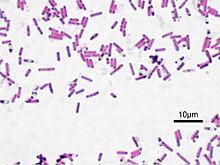Firmicutes facts for kids
Quick facts for kids Firmicutes |
|
|---|---|
 |
|
| Bacillus subtilis, Gram stained | |
| Scientific classification | |
| Domain: | |
| Phylum: |
Firmicutes
|
| Classes | |
The Firmicutes are a big group of tiny living things called bacteria. Most of them have a special kind of outer layer called a cell wall. Scientists often call this a "Gram-positive" cell wall. These bacteria are found all around us, even inside our bodies!
Contents
What are Firmicutes?
Firmicutes are a major group, or phylum, of bacteria. Think of a phylum like a big family tree for living things. These bacteria are known for their strong cell walls. This special wall helps them keep their shape and protects them.
Scientists use a test called a "Gram stain" to see these cell walls. If the bacteria turn purple, they are called Gram-positive. Most Firmicutes are Gram-positive.
Main Types of Firmicutes
The Firmicutes family is usually split into a few main groups. Each group has its own special features.
Clostridia
The Clostridia group of Firmicutes are anaerobic. This means they can live and grow without needing oxygen. You might find them in places where there isn't much air. An example is the bacteria Clostridium.
Bacilli
The Bacilli group is different. These bacteria are aerobic. This means they need oxygen to live and grow. They are often found in places with plenty of air. A well-known example is Bacillus.
Mollicutes
Then there are the Mollicutes. This is a unique group of Firmicutes because they do not have cell walls at all! This makes them very flexible. It also means they don't show up as Gram-positive in the special stain test.
Firmicutes and Your Health
Firmicutes are very important for your health, especially in your gut. Your gut is like a long tube inside your body where food is digested. It's home to trillions of tiny bacteria, called the gut flora or gut microbiome.
In Your Gut
Firmicutes make up a very large part of the bacteria living in the guts of humans and animals like mice. They help you digest your food. They also help your body get energy from the food you eat.
Energy and Weight
Scientists have found that Firmicutes play a role in how your body uses energy. They can affect how much energy your body takes in from food. This means they can be linked to things like obesity, which is when someone has too much body fat. Researchers are still learning exactly how these tiny bacteria affect our weight and health.
See also
 In Spanish: Bacillota para niños
In Spanish: Bacillota para niños
 | Toni Morrison |
 | Barack Obama |
 | Martin Luther King Jr. |
 | Ralph Bunche |

